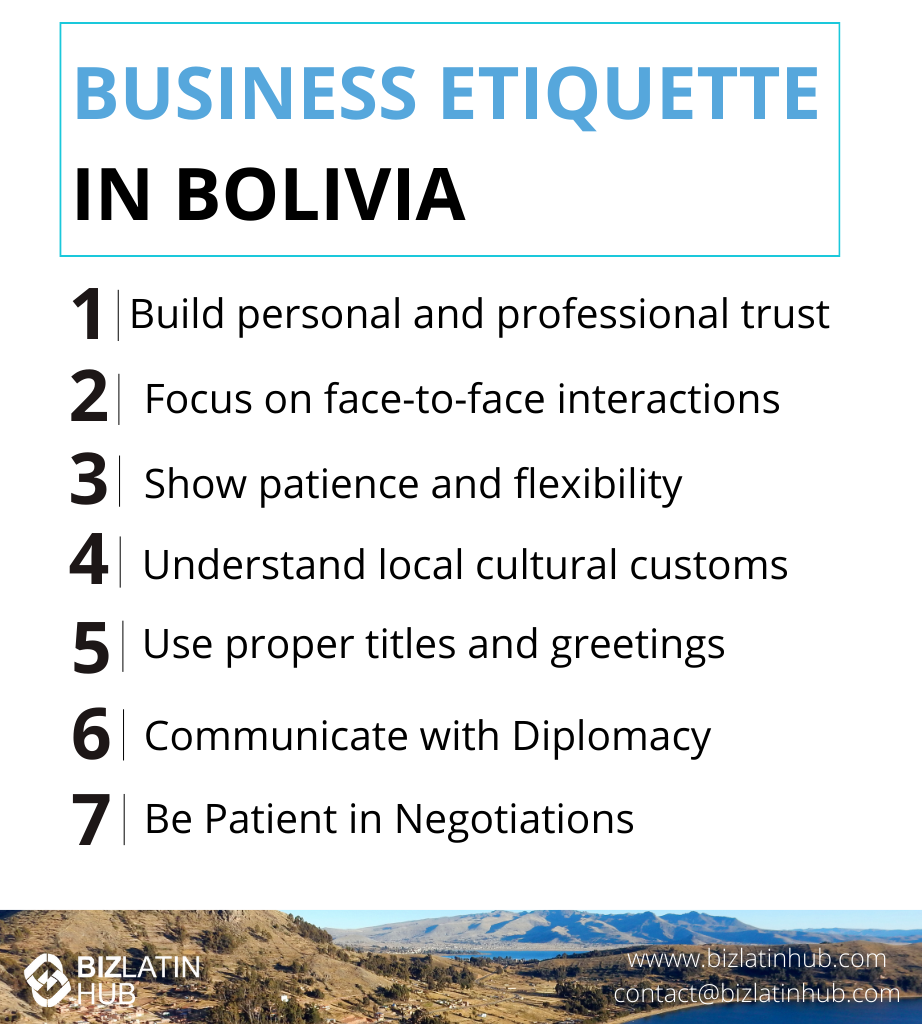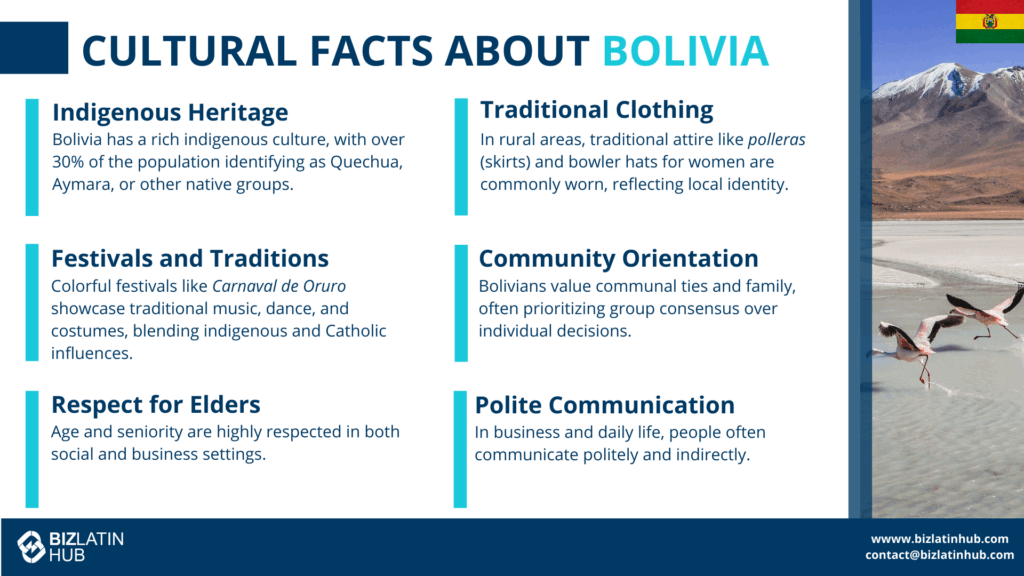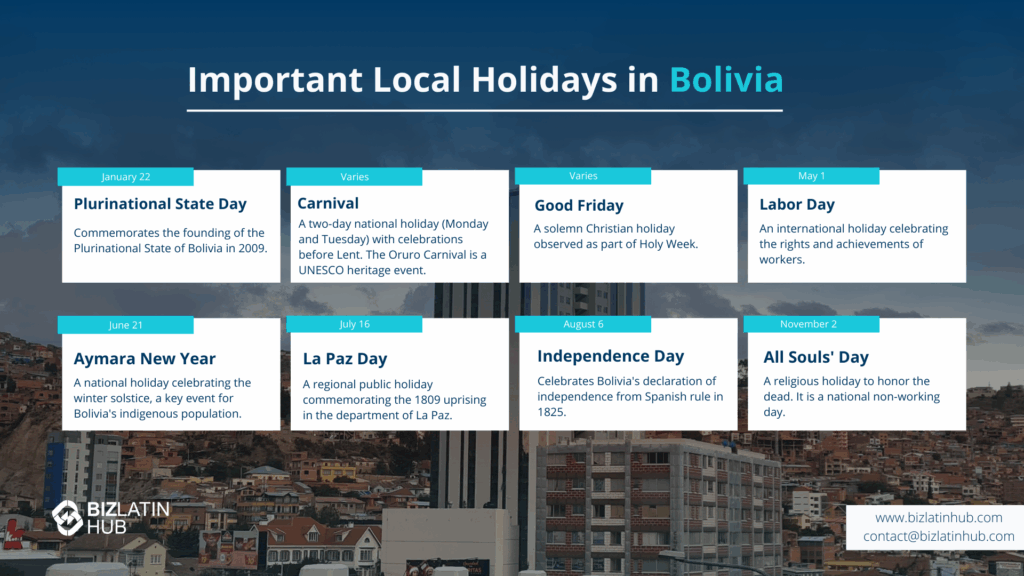Bolivia has a rich culture. Its social customs affect business. These customs offer both challenges and chances for success. To do well in Bolivian business, you need to understand family connections. You also need to understand social structures. This guide explains important parts of Bolivian business etiquette. It covers how people communicate. It describes workplace hierarchy. It details key cultural habits. This is essential if you are considering company formation in Bolivia.
With on-the-ground experience working with companies in La Paz and Santa Cruz, our Biz Latin Hub team offers practical insights to help international businesses engage effectively in Bolivia.
Understanding Bolivian Culture
Bolivian culture is varied. Catholic Spaniards shaped it. Andean traditions shaped it. Ancient indigenous groups also shaped it. Bolivia has 36 different indigenous cultures. Each culture has unique traits and traditions. Personal connections are very important in Bolivian business. People value trust as much as professional skills.
Knowing regional differences helps when working in Bolivia. Indigenous influences change from one area to another. Santa Cruz is a major city. Its business practices might be different from other places.
Business card etiquette is important in Bolivia. You should give cards written in Spanish. Show your academic degrees or ranks on the cards. These details help you earn respect.
In short, understanding these cultural points helps build good business relationships in Bolivia.
Key Points
- 36 Indigenous cultures
- Spanish is the main language
- Regional differences are important
- Business cards should be in Spanish
Knowing these points helps in making successful business deals in Bolivia.
Family links are very important in Bolivian society and business. These links can be more important than formal contracts. In business, introductions often happen through family members. Shared meals are a big part of making deals. These actions help build trust and good feelings.
In Bolivia, family means immediate relatives. It also means extended relatives. Respecting older people and the family hierarchy is a key part of this system. In business meetings, people often ask about family. This helps build good feelings. This action shows how important family is in Bolivian life.
Bolivian society puts a strong focus on family values. These values greatly affect business choices and relationships. Understanding these social systems is vital for creating strong business connections.
Key Points:
- Family Role: Very important in business interactions
- Introductions: Often happen through family
- Shared Meals: Frequent in deal-making
- Family Inquiry: Helps build good feelings
- Respect: Important for extended family and older people
This information helps you work within Bolivian business culture. It supports successful business deals.
Communication Styles in Bolivia
Communication in Bolivia uses spoken words. It also uses non-verbal signals. Spanish is the main language. People also use indigenous languages. Bolivians highly value personal connections. This focus shapes how they communicate, especially in business. People often use indirect sentences or silence instead of saying “no” directly. Non-verbal signals and facial expressions add to spoken points.
Being polite and respectful is very important. Using correct titles and formal greetings is a basic part of business meetings. Spanish is the primary business language, though Quechua and Aymara are widely spoken in other regions. Politeness and patience are appreciated—interrupting or contradicting directly may be seen as rude.
Emphasizing Personal Connections
In Bolivian business, personal relationships and trust are more important than strict rules. Building good feelings often starts with small talk. This happens before talking about business. This method helps create mutual understanding. Personal questions are common. They help make connections stronger. However, you need to be careful with sensitive topics like salary. Personal actions, like giving thoughtful gifts, can create goodwill. Using correct forms of address shows respect. This includes titles and last names. These actions help make stronger personal connections. These connections are essential in Bolivian business.
Building Trust in Business Relationships
Trust is very important in Bolivian business relationships. First meetings often focus on getting to know each other. They do not focus on direct deal-making. This focus on relationships can greatly affect professional success. Patience is important. Creating good feelings needs time. Bolivian business communication does not use direct refusals. Instead, polite sentences keep harmony and respect. Knowing and respecting social hierarchies also helps build relationships. This understanding of communication styles is vital for creating trust. It is also vital for successful business partnerships in Bolivia.
Significance of Holiday Observances
Bolivia has many national holidays. It also has many regional holidays. These holidays can greatly affect business work. Companies might close. Activities might slow down during these times. Planning for these holidays is very important, especially for business in 2025.
Año Nuevo, or New Year’s Day, is an important holiday. It is on January 1st. It is a national holiday. Most businesses in Bolivia close on this day.
Here is a list showing why holiday planning is vital for businesses:
- Prevent problems: Know holiday dates to avoid surprises.
- Schedule well: Plan meetings or important work around holidays.
- Keep good relationships: Respect local customs to build strong business connections.
Understanding how holidays affect business helps work run smoothly. It also helps in making successful deals. Thinking about holidays carefully helps create solid business connections and agreements.
Understanding social norms in Bolivian business is key to success. In Bolivia, showing respect for local customs can make business relationships stronger. Here are important parts of Bolivian business etiquette:
- Greetings: In formal situations, handshakes are the usual way to greet. People use them for introductions. They also use them for farewells.
- Punctuality: Being on time is important. However, people often allow some flexibility.
- Personal Connections: People value building personal good feelings. Bolivian professionals often choose personal connections over strict formality.
- Gift-Giving: Giving thoughtful gifts can give you an advantage in business deals.
- Dress Code: Dressing in a way that fits the situation shows respect. Know about local and regional differences in dress.
Here is a table that summarizes key points:
| Aspect | Key Point |
|---|---|
| Greetings | Handshakes are usual for introductions |
| Punctuality | Flexibility in timing is often accepted |
| Personal Connections | Important to build strong relationships |
| Gift-Giving | Seen as thoughtful and helpful |
| Dress Code | Match local and regional customs |
Understanding these norms is very important in Bolivian business culture. Knowing customs can prevent missed chances. It can also help build strong business relationships.
Hierarchical Structures in the Bolivian Workplace
Bolivian companies often have clear hierarchical structures. These structures focus on respect for authority and older staff. Employees usually show respect to managers and superiors. This shows the cultural respect for authority in Bolivia.
Bolivian companies are often hierarchical. Address the most senior person first and avoid overly casual behavior until rapport is established. Decision-making in Bolivian workplaces usually comes from the top. People in authority make the final decisions. Input from lower-level employees may be heard. However, senior members have the final power.
This hierarchical system affects how people work together. It changes how interactions happen in companies. Respect for hierarchy is a deep part of Bolivian culture. Because of this, interactions and communication usually follow these set rules.
Key Features of Bolivian Workplace Hierarchies:
- Respect for authority: Employees listen to superiors.
- Top-down decision-making: Senior staff have the final word.
- Influence on interactions: Hierarchy affects how people work together.
- Cultural respect: A deep part of Bolivian culture.
Understanding this structure is very important for working well in Bolivian business settings. Adjusting to these ways of working can help business deals go more smoothly.
Key Aspects of Business Negotiations

Business talks in Bolivia focus on building long-term relationships. These talks aim for benefits for everyone. They do not just aim for quick gains. Building trust is a top goal before starting detailed talks. Bolivian business culture values personal interactions. It also values formal talks. These interactions help form strong bonds. They prepare the way for successful deals. Foreign businesspeople should take time to understand local customs. This knowledge can prevent misunderstandings. It can also help talks go more smoothly. Patience and flexibility are important. The negotiation process in Bolivia might be slower than in Western cultures.
Importance of Punctuality
Punctuality in Bolivia is vital for business success. Being on time shows respect. It also shows professionalism. People in Bolivia may seem relaxed day-to-day. However, showing up early or on time is very important in business situations. It shows respect for others’ time. It shows dedication to the meeting. Punctuality shows the value Bolivians place on discipline in professional settings. Arriving on time can lead to better talks. It also helps build stronger connections with Bolivian partners. Making punctuality a priority is a basic part of building trust in Bolivian business culture.
The Role of Gift-Giving
In Bolivia, gift-giving is a meaningful act in business. It shows respect and thanks. It also strengthens business connections. When you visit Bolivian business partners, bring a small, thoughtful gift. Quality is more important than price. Think about items like a good pen, chocolates, or a special item from your region. This shows you value the relationship. It also expresses thanks. Refusing a gift in Bolivia is seen as rude. So, always accept gifts kindly. Smile and say, “gracias.” Gift-giving often happens with important events or holidays. These include birthdays, Christmas, and New Year. So, gifts are a formal custom. They are also a tradition in Bolivian culture.
Dress Codes for Business Meetings
Dress codes in Bolivian business meetings show professionalism and respect. Men usually wear dark suits, white shirts, and ties. Women often choose elegant dresses or business suits. Their skirts are usually at or below the knee. Simple jewelry adds to their polished look.
Good grooming is very important. What you wear shows your respect and professionalism. Wool suits are good for the cooler highland areas. Dressing right helps make a good, lasting impression.
Think about these points:
- Men: Dark suits, white shirts, ties.
- Women: Dresses or suits, knee-length skirts, simple jewelry.
- Climate: Choose clothes based on the area.
| Climate | Recommended Attire |
|---|---|
| Highlands | Wool suits |
| Lowlands | Lightweight materials |
In short, wearing formal business clothes shows professionalism and respect in Bolivia.
Greetings and Introductions
In Bolivia, a handshake is a usual and respectful greeting in business. Direct eye contact shows trust. Start greetings with the oldest or most senior person. Greeting each person one by one is important. This applies when you arrive and when you leave.
In business settings, a firm handshake is expected, typically with direct eye contact. Among women, or between men and women, one kiss on the right cheek is common if you’ve met before. In Santa Cruz, greetings can be warmer and more casual compared to the highlands.
Greetings:
- Handshake
- Direct eye contact
- Smile
In casual situations or with friends, a light kiss on the cheek might go with the handshake. A smile with a handshake shows respect and friendliness. This way of greeting is common in Bolivian business interactions.
When you are in larger groups, greet each person one by one. This custom shows politeness. It also recognizes each person’s presence. A firm handshake, direct eye contact, and a smile are key parts of a polite introduction.
Tips for Successful Greetings:
- Start with senior people.
- Keep eye contact.
- Use a firm handshake.
Understanding these actions helps create a good first impression in Bolivia. These actions show respect. They also build good feelings in business situations.
Gender Standards in Professional Interactions
In Bolivian business etiquette, knowing gender standards is important. Bolivia values cultural points and respect. This includes how genders interact in professional places.
- Professional Conduct: Both men and women should act respectfully. Equal opportunity is important.
- Dress Code: Professionals should wear business clothes. Modesty is important. Men often wear suits. Women wear dresses or suits.
- Communication Styles: Direct eye contact is common. It shows honesty and confidence. Be aware of non-verbal signals. People respect personal space.
- Leadership and Hierarchy: Senior people deserve respect, no matter their gender. Listen when they speak. Recognize their experience.
In Bolivia, people value gender equality. However, traditional roles can still affect interactions. Being aware of and respecting these differences can help build effective business relationships.
Developing Long-Term Business Relationships
Creating long-term business relationships in Bolivia depends on building trust. It also depends on personal connections. Networking is very important in Bolivia. It focuses on face-to-face interactions to build friendship. Spending time to build good feelings is key for success.
Foreign businesses should show patience and flexibility. Understand and respect local cultural customs. This includes regional and indigenous influences. Address people with proper titles. Use titles like Señor, Señora, or Doctor during first meetings. This helps create a respectful and formal connection. Building relationships may involve several meetings or even family introductions. Attend dinners or social events if invited—it’s a sign of inclusion.
A list of key points for successful business relationships in Bolivia:
- Build personal and professional trust
- Focus on face-to-face interactions
- Show patience and flexibility
- Understand local cultural customs
- Use proper titles and greetings
In Bolivia, strong business relationships often start with these actions. Following these steps can lead to successful business in the Bolivian market. Just remember, patience and time are vital for building these lasting connections.

Succeeding in Bolivia’s Business Landscape
Building strong personal relationships and trust is very important in Bolivia’s business world. These things are as important as professional skills. Patience and flexibility help in Bolivia. Decisions there often need agreement from everyone.
Understanding local customs is vital. This includes knowing dress codes and communication styles. Respect for these can lead to successful business relationships. Eye contact and personal space change from area to area. This shows the different manners in Bolivian culture.
Bolivia’s economy is diverse. It includes farming, mining, and energy. Each field has its own regional business practices. Adjusting to these differences is important for success.
Here is a list of key points:
- Make personal relationships a priority.
- Be patient and flexible in business talks.
- Understand regional differences in how business is done.
- Respect local customs, including non-verbal signals.
- Dress correctly for the situation.
By using these practices, you can work effectively in Bolivia’s business world. Success in Bolivia needs cultural sensitivity. It also needs an understanding of traditional values.
FAQs
What is the role of relationships in Bolivian business?
Personal relationships are vital. It’s common to engage in multiple meetings before negotiations begin. Family references and social rapport help establish trust.
How important is punctuality in Bolivian business meetings?
While daily life in Bolivia may allow for some flexibility, punctuality in business settings is taken seriously. Being on time shows professionalism and respect for your business partner’s time. Arriving early can help build credibility and trust in Bolivian business culture.
Should I bring a gift to a business meeting in Bolivia?
Gifts are not expected for first meetings but are appreciated for hosted dinners or milestone celebrations. Consider bringing something representative of your country.
What language is used in Bolivian business settings?
Spanish is the dominant language in Bolivian business, though regional languages like Quechua and Aymara are common in rural areas. Meetings in cities like La Paz and Santa Cruz are conducted in Spanish.
How formal is Bolivian business culture?
Bolivian business is generally formal. Use titles such as “Licenciado” or “Doctor” when addressing counterparts. Handshakes and conservative dress are expected.
How do holidays affect business in Bolivia?
Holidays in Bolivia, both national and regional, can slow or pause business operations. It’s important to plan meetings and project timelines around major holidays such as Año Nuevo (New Year’s Day). Respecting these observances helps maintain good business relationships.







